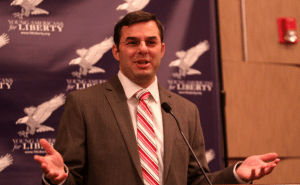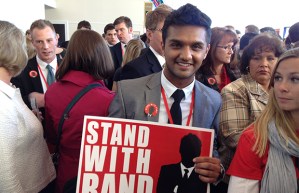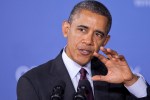At the South Carolina Republican Convention in 2009 Senator Lindsey Graham told the audience, “We are not going to build this party around libertarian ideas.”
Videos by Rare
Recently, Zack Beauchamp wrote at The Week “The GOP establishment is dying — but libertarian ideas could save the party.” Yahoo News’ Chris Moody wrote an article called, “Rand Paul is pitching libertarian ideas to social conservatives. And it’s working.” A story by Reason’s Steven Greenhut noted, “States Consider a More Libertarian Approach to Crime,” with a focus on Republican Texas Governor Rick Perry’s newfound tolerance of marijuana.
These are just the stories with “libertarian” in the title. And these are just the stories from the last week.
If we expand to libertarian-friendly titles over the last seven days, we learn that Glenn Beck is reading Matt Kibbe’s “libertarian manifesto” we see that Ron Paul supporters now lead the Nevada Republican Party and neoconservative Jonathan Tobin is asking at Commentary, “Is the GOP now Rand Paul’s party?”
Last month, The Atlantic’s Peter Beinart declared Rand Paul the Republican frontrunner.
It has been a pretty good week for libertarian ideas. In fact, it has been a great year for libertarianism in many ways.
It has been a horrible few years for Senator Graham and his ideas.
Graham called Tea Party Republicans who fought to keep the United States out of Libya in 2011 “isolationists,” and even told them to “shut up!”
Staying out of Libya was the conservative Republican position. It was also the position of most Americans.
Graham called Tea Party Republicans who fought to keep the United States out of Syria last year “isolationists” (opposing any war, anywhere, for any reason is the new definition, apparently) and said a failure to intervene might mean the United States could get nuked.
Staying out of Syria was the conservative Republican position. It was also the position of most Americans.
When we learned that the National Security Agency had been spying on virtually every American’s phone, conservative leaders and groups rose up in outrage.
Graham said he was “glad” the government was spying on everyone.
Still, opposing NSA mass surveillance remained the conservative Republican position. It was also the position of most Americans.

Justin Amash (photo: Gage Skidmore)
It was a chorus of tea party Republicans and liberal Democrats in the House in July who fell just twelve votes short of passing legislation that would have reined in the NSA’s controversial metadata collection program. That legislation was co-sponsored by Rep. Justin Amash, who is now one of the most prominent libertarian Republicans in the country due in large part to his battles with the NSA.
He is especially popular with young conservatives. In September, Amash said Graham’s consistent eagerness for war put the senator on the “extreme fringes of American society.”
Polls show Graham is now in the minority of Americans in his aggressive foreign policy views.
Rand Paul’s filibuster in the defense of due process last winter energized the conservative grassroots like no event in recent memory, creating what many called a unique and inspiring “libertarian moment” that some said “changed the Republican Party,” not to mention shifting public opinion on the issue of drones and due process by a whopping 50 percent.
Graham called it “paranoid” and a “political stunt.”
Rush Limbaugh invited Paul on his show the next day, praised him to the hilt and said the “neocons are paranoid,” not libertarians.
Next month, conservatives will yet again convene for their largest annual gathering, the Conservative Political Action Conference in Washington, DC, where last year Rand Paul won the coveted straw poll coming off the crushing popularity of his drone filibuster.
CPAC has always been heavily attended by youth, many of whom go on to become prominent leaders in the Republican Party and the conservative movement. A story in Politico Magazine Wednesday demonstrated how the conservative youth movement in the United States is now dominated by libertarians.
Writes Ben Schreckinger (emphasis mine):
(Y)ou could argue that the rapid growth of these libertarian groups has been the real story of campus politics in the Obama era. With the formal blessing of Ron Paul, (Young Americans for Liberty) has grown to 162,000 “activists” spread across 500 chapters, including 7,000 dues-paying members.
the new libertarian upstarts on the right—Young Americans for Liberty and Students for Liberty—have managed to expose what an aging infrastructure that old conservative network had become… Unlike the older conservative groups, whose upper echelons are stocked with gray hairs, both YAL and SFL appear to be truly grassroots and student-driven. YAL boasts 14,000 donors and spent $913,000 in 2011. SFL spent $663,000 between July 2011 and April 2012.
a majority of young people who know what the term “libertarian” means view it favorably, and, more so than any other age cohort, their views on whether to prioritize preserving government entitlement programs or reduce spending are aligned with those of Republicans.
Youth views and attitudes in general now closely correlate with libertarian philosophy and policies. After his drone filibuster, Graham ally Senator John McCain said Rand Paul was simply trying to excite “libertarian kids in their dorm rooms.”
McCain was right. Paul was exciting, educating and informing the next generation of conservatives.
What’s discredited today is not libertarianism, but authoritarianism, including the anti-civil liberties and neoconservative foreign policy views Republicans like Graham and McCain hang onto from the Bush-Cheney era.
No one is trying to build the GOP around those ideas anymore. Even some hawkish conservatives say the neocons are in dire need of a reality check.
The Republican Party’s current libertarian trend also reflects a shift in American attitudes across the board. Fox News’ Charles Krauthammer declared America’s “rising libertarianism” the biggest story of 2013.
Even for non-libertarians Republicans, building the GOP around the ideas of liberty seems like a more winning strategy than anything else the party has come up with as of late.
In 2009, Lindsey Graham said the Republican Party wasn’t going to be built around libertarian ideas.
In 2014, to the degree that Republicans have ideas that resonate with a majority of Americans, they are libertarian.





